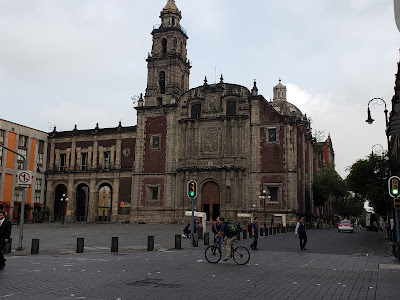 |
| Juares, Mexico |
The world we live in makes it very easy to be cynical and skeptical. There are explanations for so many things, and people are quick to dismiss what cannot be proven. The miracle of the multiplication of loaves and fish is one miracle that I have often heard explained away too. Today I would like to tell you about a similar miracle which happened quite recently.
The city of Juares, in Mexico, just across the border from El Paso, is currently considered one of the most dangerous cities in the world, with constant killings because of the drug wars. In 1972 a priest by the name of Fr. Rick Thomas and a religious sister Maria Virginia, were the instruments of an amazing miracle there.
In 1964 Fr Richard Thomas, a Jesuit, had been appointed to El Paso, in Texas. In 1970 he was profoundly touched by God and started charismatic prayer meetings in the parish. Sr. Maria Virginia, DC, was also an inspired leader. During one prayer meeting in 1972 they read the passage in Luke 14:12-14 which says,
When you give a lunch or a dinner, do not invite your friends or your brothers or your relations, or rich neighbors, in case they invite you back and so repay you. When you have a party, invite the poor… for they have no means to repay you and so you will be repaid when the upright rise again.
The prayer group decided that on Christmas day that year, 1972, they would provide a Christmas lunch to the poor who lived and worked in the dump in Juárez. The poor people in the dump used to separate the trash into various types, cans, bottles, cardboard, etc and then sell it to a co-op which would in turn sell it on. They lived in the dump and worked 7 days a week for $5. The prayer group prepared food for 125 people on Christmas Day. When they got to the dump Fr Richard and the group discovered that they had two labor unions, or trade unions. One union could not go into the other’s area. Eventually Fr Richard got them to come together in one area for the food. Three hundred and fifty people turned up, almost 3 times as many people as they were prepared for. So, Fr Richard explained that there was not enough food for everyone, but they would share what they had. After they distributed it, all 350 people had enough food; the dump people also took some food home and then came back for more, again and again. Afterwards, there was still food left over, so much so, that they took the leftovers to three orphanages.
According to Father Richard, he and those who were there have encountered the inexplicable multiplication of food on dozens of occasions — right up to today; at times aware of what was happening, in other cases noticing the miracle when they counted up items afterwards. In another example 350 cans of milk were brought to the poor, but every one of the 500 people who came, actually got one. Sacks of flour have produced flour as if from an endless supply, to the astonishment of those handing it out. They have even taken measurements of what was removed and it simply doesn’t add up.
On another occasion Fr. Rick and the others who worked with him, were praying and they felt that the Lord was telling them to go to one of the prisons with food for Christmas day. So they decided they would and after getting permission they brought what they thought would be enough food, but in fact they were seriously short. However, they just began cutting up the food and distributing it and the food began to multiply, although they didn’t realise it for a while. They ended up having enough to feed all the prisoners and all the staff as well. There is a video of this available called ‘Viva Christo Re.’ Fr. Rick Thomas died in 2006.
One of the reasons I want to tell you about these miracles is to help you to believe that this miracle of the loaves and fish, which we have just heard about, was real. I have sometimes heard it being explained away and people saying that in fact all that happened was that people were so embarrassed when they saw the little boy giving his food, that they produced their own food. It is sad when people rationalise the miracles of Jesus, as though nothing really extraordinary happened. If nothing extraordinary happened the accounts of them wouldn’t have survived 2000 years. These miracles were real and they have been passed on to us to help us to believe and to understand what the teaching of Jesus is all about.
What is even more important than the miracles themselves is what they point to. In John’s Gospel the miracles are continually referred to as ‘signs’. After the wedding at Cana in St. John’s Gospel, it says, Jesus did this as the beginning of his signs… and his disciples began to believe in him’ (Jn 2:11). All the miracles were pointing to who Jesus was, that He is the Son of God and to help those with him (and us) to believe in his teaching. His teaching is about the reality of God and the afterlife; that God is interested in us in a very personal way; and that God is very much with us. These are not just pious stories, but events that really happened, so that we might believe.
When you think of a place like Mexico and the dire poverty there, a kind of poverty that we don’t have here, wouldn’t it make more sense if the Lord worked a miracle of giving all these people work, or a better way of life? But instead the Lord gave them this miracle, this sign of his presence among them. It was a way of saying that ‘I am here among you and concerned for you.’ This gave them hope and courage and faith. Spiritual nourishment is far more important than material help, although that shouldn’t be neglected either. Apparently after the miracle of food in the prison, the whole place was completely transformed, staff and prisoners. They witnessed the supernatural and it gave them hope and a new purpose in their life. This hope is much more important than just our physical needs being met, because hope gives us the strength to endure, especially in hard times. To know that God is with us, not just in a general kind of way, but in a very intimate way, makes all the difference and gives us an interior strength for living.
It is very tempting to focus solely on the material needs of people. ‘We will eliminate poverty forever!’ You hear this said every so often, but actually we won’t. Jesus himself said that the poor would always be with us (Mk 14:7). People come to us all the time looking for material support, partly because they confuse us with St. Vincent de Paul society, but we try and help as many as we can. Whatever help we can give people is always short term, but what is more important is the fact that someone was willing to help them. I have had people burst into tears when we agreed to help them, simply because they were so desperate, but they also recognise it as God helping them in their need and that is far more important than the material help itself.
If material wealth was what we needed more than anything, then the wealthier countries should be the happiest countries, but they are not. If fact you find more anger, hatred and despair here, than in the poorest countries.
Recently I was watching a video about a place called Haulover Inlet, north of Miami. It’s a very dangerous inlet to manoeuvre and they show the different boats going in and out trying to handle the currents. In this video they showed two men in very expensive boats, cursing at each other, full of hatred and rage, because one had cut the other off. I was thinking, if this is where your million dollar boat has got you, it is a sad sight. Another man was cursing at the camera man simply because he was taking the video. These people had great wealth, but were full of anger and hatred.
The miracles of Jesus are meant to help us in the same way; to encourage us, to give us hope and to remind us that Jesus is with us, aware of all our needs and constantly looking after us. Our prayers may not always be answered in the way we would like them to be, but it is more important to know that the Lord is with us.
‘When the people saw the sign he had done, they said, “This is truly the prophet who was to come into the world.”’

























